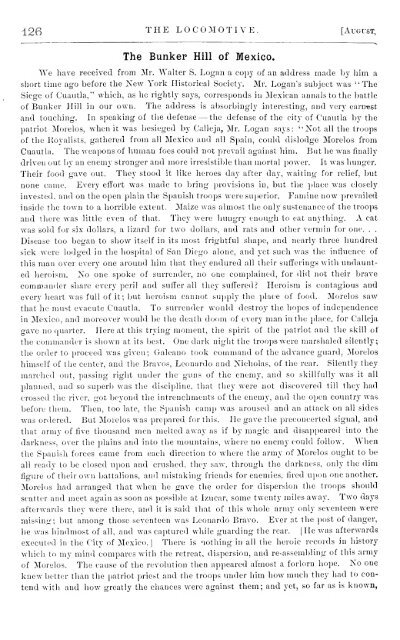The Locomotive - Lighthouse Survival Blog
The Locomotive - Lighthouse Survival Blog
The Locomotive - Lighthouse Survival Blog
Create successful ePaper yourself
Turn your PDF publications into a flip-book with our unique Google optimized e-Paper software.
126 THE LOCOMOTIVE. [August,<br />
<strong>The</strong> Bunker Hill of Mexico.<br />
We have received from Mr. Walter S. Logan a copy of an address made by him a<br />
short time ago before the New York Historical Society, Mr. Logan's subject was "<strong>The</strong><br />
Siege of Cuautla," which, as he rightly says, corresponds in Mexican annals to the battle<br />
of Bunker Hill in our own. <strong>The</strong> address is absorbingly interesting, and very earn-est<br />
and touching. In speaking of the defense — the defense of the city of Cuautla by the<br />
patriot Morelos, when it was besieged by Calleja, Mr. Logan says: "Not all the troops<br />
of the Royalists, gathered from all Mexico and all Spain, could dislodge Morelos from<br />
Cuautla. <strong>The</strong> weapons of human foes could not prevail against him. But he was finally*<br />
driven out by an enemy stronger and more irresistible than mortal power. It was hunger.<br />
<strong>The</strong>ir food gave out. <strong>The</strong>y stood it like heroes day after day, waiting for relief, but<br />
none came. Every effort was made to bring provisions in, but the place was closely<br />
invested, and on the open plain the Spanish troops were superior. Famine now prevailed<br />
inside the town to a horrible extent. Maize was almost the only sustenance of the troops<br />
and there was little even of that. <strong>The</strong>y were hungry enough to eat anything. A cat<br />
was sold for six dollars, a lizard for two dollars, and rats and other vermin for one. . .<br />
Disease too began to show itself in its most frightful shape, and nearly three hundred<br />
sick were lodged in the hospital of San Diego alone, and yet such was the influence of<br />
this man over every one around him that they endured all their sufferings with undaunt-<br />
ed heroism. No one spoke of surrender, no one comj)lained, for did not their brave<br />
commander share every peril and suffer all they suffered? Heroism is contagious and<br />
every heart was full of it; but heroism cannot supply the place of food. Morelos saw<br />
that he must evacute Cuautla. To surrender would destroy the hopes of independence<br />
in Mexico, and moreover would be the death doom of every man in the place, for Calleja<br />
gave no quarter. Here at this trying moment, the spirit of the patriot and the skill of<br />
the commander is shown at its best. One dark niglit the troops were marshaled silently;<br />
the order to proceed was given; Galeano took command of the advance guard, Morelos<br />
himself of the center, and the Bravos, Leonardo and Nicholas, of the rear. Silently they<br />
marched out, passing right under the guns of the enemy, and so skillfully was it all<br />
planned, and so superb was the discipline, that they were not discovered till they had<br />
crossed the river, got beyond the iutrenchments of the enemy, and the ojjcn country was<br />
before them. <strong>The</strong>n, too late, the Spanish camp was aroused and an attack on all sides<br />
was ordered. But Morelos was prepared for this. He gave the preconcerted signal, and<br />
that army of five thousand men melted away as if by magic and disappeared into the<br />
darkness, over the plains and into the mountains, where no enemy could follow. When<br />
the Spanish forces came from each direction to where the army of Morelos ought to be<br />
all ready to be closed upon and crushed, they saw, through the darkness, only the dim<br />
figure of their own battalions, and mistaking friends for enemies, fired ui)on one another.<br />
Morelos had arranged that when he gave the order for dispersion the troops should<br />
scatter and meet again as soon as possible at Izucar, some twenty miles away. Two days<br />
afterwards they were there, and it is said that of this whole army only seventeen were<br />
missing; but among those seventeen was Leonardo Bravo. Ever at the post of danger,<br />
he was hindmost of all, and was captured while guarding the rear. [He was afterwards<br />
executed in the City of Mexico.] <strong>The</strong>re is nothing in all the heroic records in history<br />
which to my mind compares with the retreat, dispersion, and re-assembling of this army<br />
of Morelos. <strong>The</strong> cause of the revolution then appeared almost a forlorn hope. No one<br />
knew better than the patriot priest and the troops under him how much they had to contend<br />
with and how greatly the chances were against them; and yet, so far as is known,
















